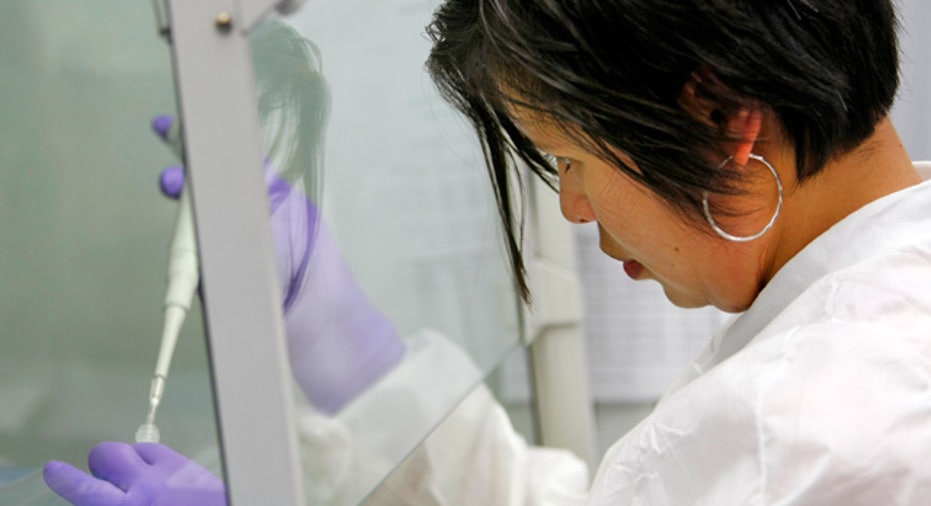Sanofi Faces Make-Or-Break Verdict On Big Dengue Vaccine Bet

Sanofi expects final clinical results for its vaccine against dengue by late September, the French drugmaker's project leader has told Reuters, and has already gambled on starting production despite some disappointing early trials data.
Sanofi has invested more than one billion euros in the project and is hoping to become the first drugmaker to sell such a shot next year after two decades of research on the world's fastest-growing tropical disease, for which there is no preventative treatment.
Sanofi Pasteur, the French drugmaker's vaccine unit, has made a big industrial bet: it started producing the vaccine last July to keep a lead over competitors and ensure it is ready to ship doses, assuming it finally gets approved by regulators.
The investment highlights the time-consuming and capital-intensive nature of the vaccines business.
Sanofi is upbeat - but based on clinical trial results so far, many analysts believe approval is far from assured. All are waiting for the upcoming data to determine whether the vaccine will be a blockbuster.
"Today we are confident our vaccine can have an impact on public health and we are gearing up for its success," Guillaume Leroy, who heads the dengue vaccine project at Sanofi Pasteur, said in an interview.
Leroy said the results of a final clinical trial on 30,000 children in Latin America and southeast Asia would start trickling in from mid-year. He said as soon as his team could draw reliable preliminary findings it would unveil these.
By the end of the third quarter, Sanofi will have full consolidated clinical results that it hopes to present at a conference on tropical diseases in November.
If the data is positive, Sanofi hopes to sell the vaccine around late 2015 in at least one country affected by the disease, most likely one of the 10 that took part in the trials.
"It's hard to predict which one could be first, but one can easily imagine it'll be one of the bigger countries, such as Brazil, Mexico, Malaysia, maybe the Philippines," Leroy said.
Dengue fever - also known as "breakbone fever" because of the severe pain it can cause - is an infectious mosquito-borne disease that thrives in tropical regions. It infects 50 to 100 million people each year, according to the World Health Organization - and some experts put the number at triple that level.
Most patients survive dengue but it kills an estimated 20,000 people each year, many of them children.
RISKY BET, POTENTIAL BLOCKBUSTER
For now, Sanofi's project is still a huge gamble.
Sanofi started working on the vaccine 20 years ago and has invested over 1 billion euros ($1.38 billion) in research and development, plus more than 300 million euros into a dedicated production plant outside of Lyon in southeast France.
The sparkling white facility, which was the first investment approved by Chief Executive Chris Viehbacher when he took the helm in 2008, will be able to produce up to 100 million doses per year from late 2017, Leroy said.
In this new unit, lab workers dressed from head to toe in protective gear cultivate living cells and bring them into contact with the virus to make pouches of antigens for each of dengue's four serotypes to be mixed together later on.
Coming up with a vaccine that can protect against the four strains of the disease has puzzled scientists for over 70 years, since the movement of troops during World War II helped dengue spread across the Pacific and become a worldwide pandemic.
"These serotypes vary from one country to the next and from one season to the next," Leroy explained. "Predicting their incidence is very difficult."
Data released in late 2012 from a trial in Thailand showed Sanofi's vaccine failed to protect against one the disease's four strains, which happened to be the most prevalent in the country at the time.
Following those disappointing results some analysts cut its chances to around 50 percent - but even if it is not perfect, medical experts believe it is likely to be used to some degree.
Analyst forecasts show the vaccine could reap annual peak sales of 1 billion euros within a few years of launch, significantly boosting Sanofi's vaccines business, which generated sales of 3.7 billion euros in 2013.
"From a vaccines perspective this clearly is exciting, because it's an area of unmet medical need, and Sanofi are potentially first in class," said Citi analyst Peter Verdult.
Rivals such as Takeda, Merck & Co, GlaxoSmithKline and Novartis are also working on dengue vaccines, but these have not reached Phase III trials.
Verdult said success for Sanofi would hinge on the strength of the final data and on pricing, which he sees likely between $10 and $50 a dose, though he noted Sanofi has sponsored health economic studies suggesting cost effectiveness up to $100.
"Clearly if the data shows efficacy on only three of the four strains, it's going to be a lot more difficult for them to charge the higher end of that range," he noted.
The vaccine, which is given in three shots six months apart, is currently being tested in 10,000 children aged 2-14 in southeast Asia and in 20,000 children aged 9-16 in Latin America. So far, the trial shows the vaccine is well tolerated, with no significant side effects reported, Leroy said.



















